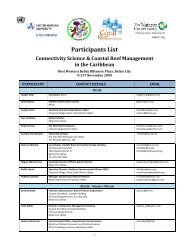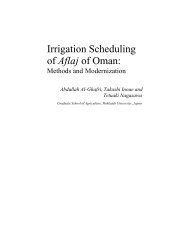The Global Water Crisis: Addressing an Urgent Security - Unu-inweh ...
The Global Water Crisis: Addressing an Urgent Security - Unu-inweh ...
The Global Water Crisis: Addressing an Urgent Security - Unu-inweh ...
You also want an ePaper? Increase the reach of your titles
YUMPU automatically turns print PDFs into web optimized ePapers that Google loves.
Introduction<br />
<strong>Water</strong> conflicts are numerous, <strong>an</strong>d they may arise through the confrontation of two or more cosmogonies <strong>an</strong>d their<br />
respective social perceptions of water’s value, among other reasons. Such examples exist from the Colonial period in Latin<br />
America: while for indigenous people, lakes were a source of multiple material <strong>an</strong>d spiritual assets, for the Sp<strong>an</strong>iards they<br />
were a source of disease because of the stagn<strong>an</strong>t <strong>an</strong>d foul-smelling waters. It was this latter conception that instigated<br />
the desiccating of the lakes, which in the valley of Mexico was achieved by draining its water to <strong>an</strong>other watershed basin<br />
(Musset, 1992; Espinosa, 1996).<br />
Today, this contrast in values is reflected in the dichotomy that exists between institutions <strong>an</strong>d social agreements in the<br />
m<strong>an</strong>agement of water at the community level. <strong>The</strong> state ignores the water rights of indigenous peoples <strong>an</strong>d introduces<br />
new modalities, from supporting individual rights to the public <strong>an</strong>d private m<strong>an</strong>agement of water.<br />
However, the conflict is more deeply rooted in the free-of-charge <strong>an</strong>d collective access to water, given that the state promotes<br />
the re-valuation of water as <strong>an</strong> economic good that should have a market value <strong>an</strong>d price. In this sense, disassociating<br />
or even omitting the existence of the social <strong>an</strong>d cultural dimensions of water is a way of end<strong>an</strong>gering both the basis of<br />
contempor<strong>an</strong>eous civilizations <strong>an</strong>d indigenous regions where there is a culture of sustainable use <strong>an</strong>d m<strong>an</strong>agement of<br />
water. In addition, it is a way of generating water conflicts <strong>an</strong>d of attacking collective rights <strong>an</strong>d forms of m<strong>an</strong>agement in<br />
indigenous territories that since <strong>an</strong>cient times have supported a sustainable appropriation of water (Ávila, 1996).<br />
1. <strong>Water</strong> <strong>an</strong>d Cosmogony<br />
Throughout history, water has had deep, mythical-poetic <strong>an</strong>d socio-cultural me<strong>an</strong>ings <strong>an</strong>d values associated with cosmogony<br />
<strong>an</strong>d with the perception of the world <strong>an</strong>d nature (León Portilla, 1992; Ilich, 1993; Esterm<strong>an</strong>n, 2006). This has resulted in<br />
cultural ways of m<strong>an</strong>aging water within <strong>an</strong> integrated water-l<strong>an</strong>d-forest matrix, <strong>an</strong>d in a social recognition of water as a<br />
collective good or common (Robert, 2002).<br />
<strong>The</strong> relev<strong>an</strong>ce of recognising the value of water in its largest sense is a key factor in underst<strong>an</strong>ding the past <strong>an</strong>d present<br />
existence of water cultures that have been founded on the principles of social <strong>an</strong>d environmental sustainability (Ávila, 1996;<br />
Palerm, 1972; Rojas, 1985). Historically, water has been a common good that is socially regulated in order to guar<strong>an</strong>tee a<br />
more equitable access to it; <strong>an</strong>d since not being dissociated from the territorial water-l<strong>an</strong>d-forest matrix, its appropriation<br />
was based on <strong>an</strong> integrative logic <strong>an</strong>d on the profound knowledge of the cycles of nature (Espinosa, 1996; Robert, 2002).<br />
For Mesoameric<strong>an</strong> <strong>an</strong>d Ande<strong>an</strong> peoples alike, water was considered a gift from the gods with which they would live <strong>an</strong>d<br />
strengthen (León-Portilla, 1992; Esterm<strong>an</strong>n, 2006). <strong>The</strong> availability of water in the territory contributed to the birth of<br />
communities <strong>an</strong>d peoples that settled following the l<strong>an</strong>d-water-forest patterns along valleys, hills <strong>an</strong>d mountains in which<br />
springs <strong>an</strong>d rivers had their source. Conservation <strong>an</strong>d adequate m<strong>an</strong>agement of water, l<strong>an</strong>d <strong>an</strong>d forests enabled life itself<br />
<strong>an</strong>d the development of communities. It also was the basis for the flourishing of the Mesoameric<strong>an</strong> <strong>an</strong>d South Americ<strong>an</strong><br />
hydraulic societies (Palerm, 1972; Rojas, 1985, Gelles, 2000).<br />
Indigenous peoples created rights, regulations <strong>an</strong>d collective practices about water in order to guar<strong>an</strong>tee its adequate<br />
use <strong>an</strong>d appropriation (León-Portilla, 1992; Robert, 1994; Ávila, 1996). As stated by Robert (2002): “In history, water has<br />
been the great maker of communities. Always people from diverse origins learned to share the same fountains <strong>an</strong>d to<br />
coexist beside the same rivers <strong>an</strong>d, by the act of concluding agreements, set the bases of a community.”<br />
Free-of-charge water supply was associated with its divine nature, as water was considered a gift from the gods. This<br />
enabled free access to water, which was then regulated by communitari<strong>an</strong> actions (such as tasks <strong>an</strong>d festivities), <strong>an</strong>d by<br />
the creation of rights for collective water use <strong>an</strong>d m<strong>an</strong>agement. In this framework, water was considered to be a common<br />
good contributing to the reinforcement of the territorial links of belonging <strong>an</strong>d identity.<br />
Access to <strong>Water</strong> <strong>an</strong>d Conflict: An Indigenous Perspective from Latin America<br />
Part 3<br />
143




